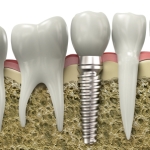
The traditional approach to placing dental implants was to submerge them and keep them load-free for 3–8 months to minimize the risk of implant failures. During the healing phase temporary prosthesis are often used and patients can find these uncomfortable. Consequently shorter healing periods without jeopardizing implant success would be beneficial. Nowadays immediate and early loaded implants are commonly used and a Cochrane review in 2009 (Espositio et al) found no statistical difference between these two approaches and called for more well designed randomised controlled trials. The aim of this trial was to compare immediate versus early non-occlusal loading of dental implants placed flapless in a 3-year, parallel group.
This was a single site study. Patients were randomised to either the immediately loaded group ( n=30) or the early loaded group ( n=30). One experienced surgeon performed all the operations. The outcomes were prosthesis failure, implant failure, biological or prosthetic complications and peri implant marginal bone level. The majority of patietns receive a single implant.
At 3 years there was
- One drop out in the test group and 3 in the control group.
- No prosthesis on implant failed.
- There were two complications in the control group and one in the test group.
- The mean bone level was 1.91 mm for test group and 1.59 mm for control group. The adjusted difference in bone level was 0.26 mm (CI 95% -0.08 to 0.59, p = 0.1232)
The authors concluded
The null hypothesis of no difference in failure rates, complications and bone level between implants that were loaded immediately or early at 3 years cannot be rejected in this randomized clinical trial.
Merli, M., Moscatelli, M., Mariotti, G., Piemontese, M. and Nieri, M. (2012), Immediate versus early non-occlusal loading of dental implants placed flapless in partially edentulous patients: A 3-year randomized clinical trial. Journal of Clinical Periodontology, 39: 196–202. doi: 10.1111/j.1600-051X.2011.01821.x
Related reviews
As noted above a Cochrane review of this question was published in 2009 . That review included 22 trials. Twelve trials compared immediate versus conventional loading, three early versus conventional loading, six immediate versus early loading, and one occlusally versus non-occlusally loaded implants.
At that time they concluded
It is possible to successfully load dental implants immediately or early after their placement in selected patients, though not all clinicians may achieve optimal results. It is unclear whether it is beneficial to avoid occlusal contacts during the osseointegration phase. Trends suggest that immediately loaded implants fail more often than those conventionally loaded, but less commonly than those loaded early. If a clinician wishes to load the implants early, it might be wiser to load them immediately (within 1 week) rather than waiting for 1 or 2 months. A high degree of primary implant stability (high value of insertion torque) seems to be one of the prerequisites for a successful immediate/early loading procedure. More well designed RCTs are needed and should be reported according to the CONSORT guidelines.
Esposito M, Grusovin MG, Achille H, Coulthard P, Worthington HV. Interventions for replacing missing teeth: different times for loading dental implants. Cochrane Database of Systematic Reviews 2009, Issue 1. Art. No.: CD003878. DOI: 10.1002/14651858.CD003878.pub4.

Interesting topic – the limitation of this study is the lack of variation in implant sites which has a great impact on stability and integration of implants